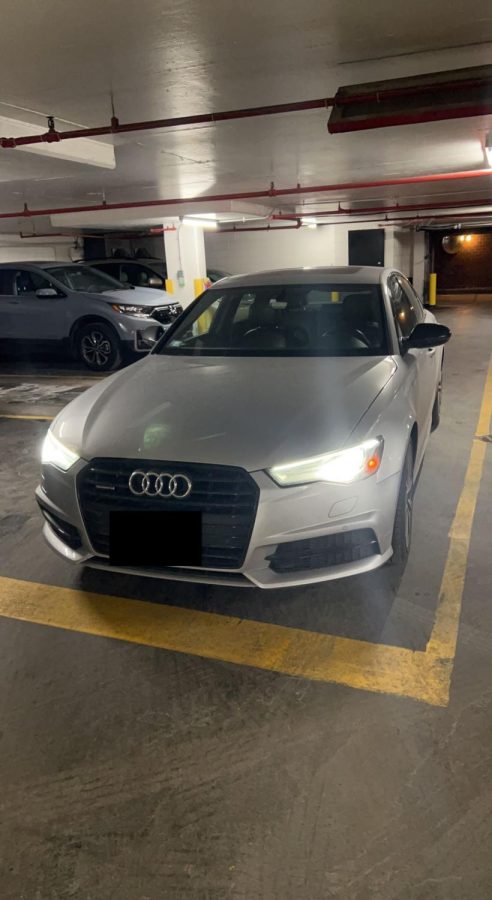by Lindley McCutcheon
I was crying in the small yellow stall, all pigeon-toed and red-faced, unable to stop the constant stream of hot tears. I felt awful; I felt out of place; I felt like I wasn’t cool enough. I was in fourth grade, and it was the first time I remember feeling that I didn’t fit in at Latin. That day was one of many where I was made fun of because I didn’t have “real” UGGs. All the way home, I cried in the car, begging my father to buy me UGGs. In reality, I was begging him to buy a way for me to feel less alone. In preparation for this speech, I told this story to my mother as “The First Time I Knew I was Different”. She promptly corrected me. She told me that one day when I was around five years old, I asked when we were going to get a summer home like my friends at school. My mother explained to me that “We have a summer home, an autumn home, a winter home and a spring home. A home that is very nice.” I recognized the point she was making: Our current home was our summer home. My five-year-old self also recognized that–unfortunately unlike my classmates—we were never going to have a summer home. Even from a young age, I noted that other people had nicer things than I did. Nicer houses, nicer cars, and nicer clothes, like the $200 pair of UGGs. A more recent issue in my out of school life on my travel hockey team is a change of uniform in the past couple of years. Girls from all across the city replaced their outer-attire, spending hundreds of dollars on new gloves, helmets, pants, etc. in order to fit the new navy theme. As for myself, I’ve had the same red helmet since Learn-to-Skate (Learn-to-Skate being quite self-explanatory: where one learns… to skate). Besides, helmets are expensive, ranging from $100 to $300 brand new. I’m constantly pressured by my team, my coaches, and even the team manager, to spend money I don’t necessarily have on something I don’t necessarily need. As my dad says, “everyone’s very willing to spend our money.” It’s problematic how little our grade, and the school as a whole, discusses financial aid. My freshman year, when Project Weeks had just come out, I was in the hallway with Lily and someone else from our grade. I told them I was in “Waves, Sound, and Light” (a project week I was genuinely excited for), and he immediately questioned why I didn’t sign up for an out-of-town Project Week. When I said that my financial aid only covers one out-of-town, Lily lost it. She started ranting about how no one talks about financial aid, this big, awkward, scary elephant in the room. It was November and she had heard no mention of anyone else being financial aid. It was refreshing for her, and also probably scared him a little bit. On the same subject, I recall later that year in Affective Ed, Ms. Tate brought up the statistic that ¼ of students at Latin are granted some form of financial aid. In the seconds that followed, I felt uncomfortable. Pitying glances came my way from students unsure of how to discuss this ‘taboo’ subject of ~financial aid~. I’ve never been able to figure out why the world is this way-not speaking of things for as long as possible, not even until November of freshman year. Maybe it’s scary because their whole lives they’ve been told to not discuss money; Maybe it’s scary because they feel they have to tiptoe around their words; Maybe it’s scary because it is just so foreign. That day, I stayed after class with Ms. Tate, herself having gone through similar situations. We bonded over how we were the ones whose shoes were so worn that the bottoms were peeling off, or how we were the ones who never got to leave town over break because it would cause stress on our parents’ bank accounts, or how we were the ones who never went out to lunch because they didn’t want to waste money. In class that day, we also talked about how pronounced families’ affluence is after a break in the school year. In fact, the night after choosing this, this messy, invisible subject, to be my speech topic, I was watching a show called Atypical and there’s this girl, Casey, who’s transferring to a private school, much like Ignatius, or Loyola, or Latin. The first day of second semester, kids are talking about where they went for winter break, many responses being “I went to Aspen, ugh, so boring” or “My parents are on this kick where they take us to a different European city every break and it’s getting so tiring”. When eyes shift to Casey, she simply states: “I went to Target a couple of times” and all of the girls, clad with uniform and brand new shoes, laugh at her ‘joke’. This joke is my reality. I’m the girl who’s just going to Ohio, who hasn’t been to Europe, whose ‘shopping-spree’ consists of buying three shirts at Target with my hard earned babysitting money, never asking to borrow from her parents who will, without any hesitation, say, “Money’s tight right now, we have to slow it down because of college”, or something along those lines. All of that being said, I am so fortunate to live the life I live and go to this school and have food and water and have a roof over my head. And everyone says this. That they’re grateful for what they have. But they never talk about what they have that others can’t afford. But money, the foundation of our country and the vast majority of others, should never be the elephant in the room. It should not be a subject you hear about in the middle of your freshman year. We need to have these conversations—these awkward, tip-toey conversations—in order for any normality and a sense of understanding between each other and our lives. Oh, and I never finished my mom’s quote from before. She ended her advice with this: “I am happy having a single, beautiful home and a job that I love. I have never been interested in having a job just for the money, and having money for more than one home has never been a goal for me. [She] told [me] that compared to the entire world, we are quite wealthy.”
Categories:
"My Summer Home"
February 18, 2019

12
1
More to Discover




















































lcampbel • Feb 28, 2019 at 8:05 pm
Lindley, thank you so much for writing this. Reiterating what everyone else said above, this topic of conversation truly doesn’t get enough airtime at our school. A classmate of mine and I were recently talking about this the other day: how many students at Latin from very high socioeconomic statuses regularly flaunt their wealth on social media, which often tends to exacerbate this feeling of “being different” you so eloquently discussed. Thank you for sharing your perspective and shedding light on a crucial issue at our school.
obaker • Feb 20, 2019 at 10:10 am
We don’t talk about this enough. Thanks so much for sharing, Lindley!
Olivia Patinkin • Feb 20, 2019 at 9:02 am
SO articulate and well-conveyed. Proud of you and love you v much, McCutch!
jwalker • Feb 19, 2019 at 11:47 pm
Thank you for this, it is something the Latin community really needs to hear!
irickett • Feb 19, 2019 at 10:06 pm
Such a great piece, Lindley! Thank you for bringing the topic of financial aid/socioeconomic status to light as it’s often overlooked at Latin.
rigbokwe • Feb 19, 2019 at 8:58 pm
Thank you for writing about this important and often ignored issue. I’ve been fairly open about the fact that I’m on financial aid here but even then, I sometimes feel like it’s something to hide. I have to say it again: THANK YOU for sharing this story. 🙂 🙂
At the same, I sometimes worry about the pressure put on students who don’t feel as comfortable talking about financial aid. The challenge here is not only talking more what it means to be on financial aid but creating a culture where it is understood that this is FAR from something anyone should feel ashamed of.
aroehm • Feb 19, 2019 at 7:01 pm
Great article Lindley: I think this is an important topic thats often overlooked, especially at a school like ours.
abolandh2 • Feb 19, 2019 at 6:43 pm
Thank you for using this piece to de-stigmatize a topic that many deem to be “taboo.” Beautifully written too!
nschuler • Feb 19, 2019 at 12:55 pm
Eye-opening. Thank you.
tkendrick • Feb 19, 2019 at 10:33 am
Great piece, Lindley. Thanks for sharing your perspective with the community – hopefully this makes for a slightly less awkward conversation for someone else. Let’s not tip-toe around this issue any longer.
zmcarthur • Feb 19, 2019 at 8:51 am
Really nice and important story, Lindley. It’s quite the school when middle-class students like yourself feel so different than the vast majority! One weakness of Latin’s student body, in my mind, is the polarization of wealth – we have lots of rich kids, and a good number of students on full aid, but very few middle-class students. (Most middle-class students are teachers’ kids, and that population is capped at a certain % of the student body I believe). When’s the last time you heard someone’s mom or dad was a police officer, or nurse, or another working-class profession?
tkendrick • Feb 19, 2019 at 10:44 am
ZMAC: as we child-less faculty folk may not have known, the school recently modified how it supports faculty children attending Latin. It hadn’t been capped as a % of the student body, but is now connected to a faculty or staff’s date of hire and their children’s acceptance into the school. Thanks for supporting Lindley’s point of view here!